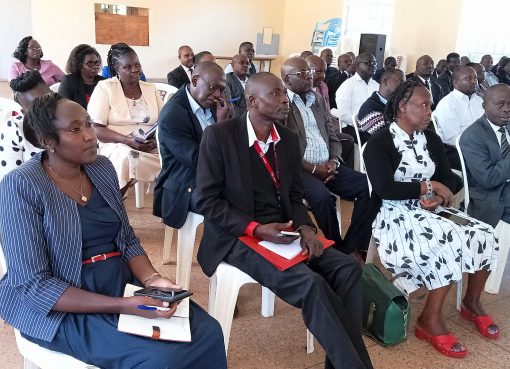The County Government of Nakuru has initiated a scheme to encourage adoption of technology and mechanized farming among small holder farmers in a bid to improve production and quality of their produce.
County Executive Committee Member for Agriculture, Livestock and Fisheries Dr Immaculate Maina said the devolved unit had acquired farm equipment valued at Sh 25 million for distribution to small scale farmer groups in the first phase of the project dubbed ‘Agriculture Mechanization Services’ (AMS).
Dr Maina stated that the devolved unit had entered into a partnership with JOSAM Africa which will link providers of mechanized farm services with small holder farmers who do not have agricultural machinery.
The partnership, she indicated, was aimed at giving younger farmers opportunities to embrace better mechanized food production to increase yields in addition to using certified seeds.
“Farmers in Nakuru County will now have access to subsidized mechanization services following the partnership with JOSAM Africa. The project will help reduce over reliance on human labor which is not economical. Farmers will enjoy increased yields in their farm produce. Five mechanization hubs will also be set up across the County,” stated the CEC.
She added, “Technological advancements have enabled manufacture of light and cheaper machines that can help small holder farmers revolutionize agriculture both in terms of quantity and quality of products grown and processed.
The County has distributed equipment to Inua Hustler group in Gilgil Sub County and supported other farmer groups with mechanization services amounting to Sh 20 million. We have distributed equipment worth Sh10.5 million to a farmer’s group in Elementaita within Gilgil Sub-County. The county has spent a further Sh 13.7 million to procure a forage harvester, one baler, a rotary mower, a rake, a Gyro mower, a tipping trailer, a chisel plough and a tractor.
Speaking when she signed a Memorandum of Understanding with JOSAM Africa, the CEC said the notion that mechanization is only for those in large-scale farming was misguided and a threat to Kenya’s food security.
“The need to boost crop yields to feed Kenyans is becoming a priority. All manufacturers need to contribute towards realization of the government’s Big 4 Agenda. Technological advancements and innovations have helped small-scale farmers improve productivity thus making agriculture more profitable.
The County is seeking ways of achieving Big 4 Agenda on food security which iinclude mechanized farming, irrigation, and use of quality seeds and appropriate fertilizers,” she further said.
Dr Maina noted that mechanized farming contributed to timely preparation of land, efficient land use and increased production. It also reduced the cost of production and created more employment opportunities particularly among the youth.
The CEC revealed that her department was in talks with various lenders with a view of coming up with affordable financing opportunities for small scale farmers wishing to acquire machinery.
She said small holder farmers will also be equipped with technical know how to operate and maintain the machinery through field days, workshops, farm visits and seminars to enable them become commercially successful.
The CEC noted that soil erosion and poor seed beds are common challenges witnessed in the county due to lack of skills in machine operation.
Dr Maina stated that the County was working with dealers and manufacturers of farm machinery to ensure that their products targeting small scale farmers were built with simplicity of design, unsurpassed reliability, outstanding fuel economy and minimal maintenance requirements.
“We are encouraging dealers in farm equipment whose services should consist of genuine spare parts centres and nationwide mobile service coverage to set shop in Nakuru. We are working with several institutions that will extend farmers financing to purchase modern equipment.
Asset financing should be tailor-made to suit the abilities of both small holders and large scale farmers. Since some new farmers lack experience with planters, tractors and implements, dealers are encouraged to put in place training as part of the package for new owners. This should entail showing buyers how to maximize the use of their machinery to boost their food production by using mechanization” said the CEC
Dr Maina observed that small scale dairy farmers should embrace mechanized technology in making their own animal feeds translating to quality fodder which will not only increase milk production but also beef, mutton and the quality of hides and skins.
According to Egerton University’s Tegemeo Institute of Policy and Research Analysis, the cost of producing a litre of milk in the country is between Sh19 to Sh25. But industry players want the cost reduced to Sh14 to be able to remain competitive within the East Africa region.
Dr. Maina noted that dairy feeds accounted for averagely 70 percent of the cost of production and that if farmers employed mechanized technology to mix their own feeds at home, it will directly reduce the cost of producing milk.
She said that as long as farmers use the right ingredients when making their own feeds, the quality will be good.
“What is produced by some feed manufacturers is not necessarily of high quality. Various samples of animal feeds have been analysed and found to be of poor quality. It is better for small scale dairy farmers to mix their own feeds where they are guaranteed of the quality and quantity of ingredients”, Stressed the CEC.
The County, she said, is working on a mechanization policy that will guide training of farm equipment operators by various stakeholders in partnership with manufacturers and their appointed dealers.
by Jane Ngugi





